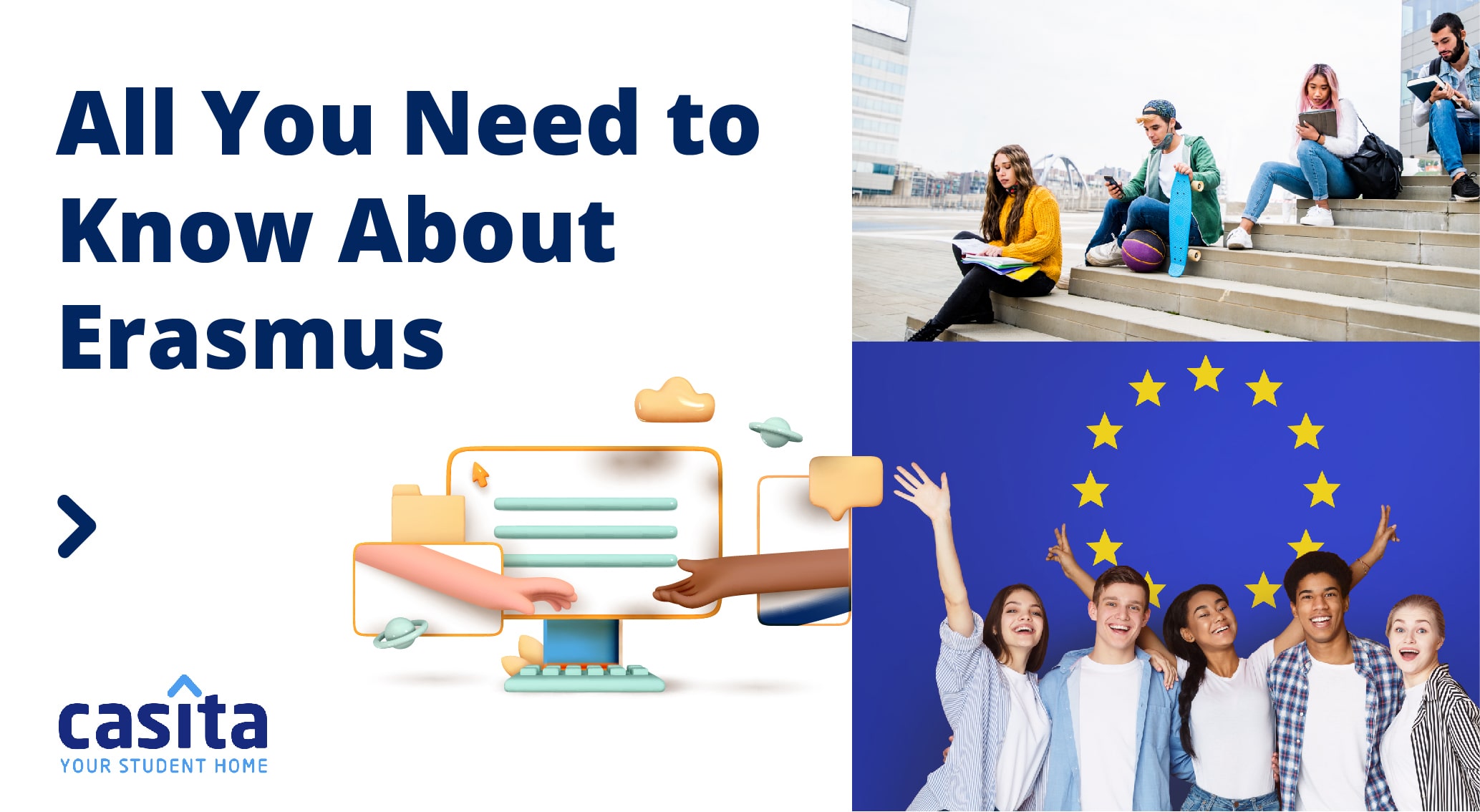All You Need to Know About Erasmus
Tips and Advice
University Life
4 mins read
Share

Updated at: 25 November, 2025
Published at: 31 May, 2022
By Allaa Ashraf
All You Need to Know About Erasmus
Tips and Advice
University Life
4 mins read

Updated at: 25 November, 2025
Published at: 31 May, 2022
By Allaa Ashraf
Share
If you’re after a one-of-a-kind learning experience, then studying abroad is the best option for you. If you’re seeking international education, then surely you’ve heard of Erasmus. If you didn’t, then well, this article is for you.
This article provides a detailed explanation of the Erasmus Programme, including how it works, how you can take part in it, and what benefits it can give you.
What is Erasmus?
Erasmus is a European Union initiative that promotes student, graduate, and youth mobility and cultural exchange. It is one of the most popular exchange programmes in Europe. The Erasmus programme is very useful for students and young professionals who wish to learn new languages and cultures.

How does the programme work?
The Erasmus+ Programme will provide participants with financial aid to help them meet their expenses. This programme is offered for two types of people:
A. Students
Those who qualify for the programme can participate in periodic education programmes in a country of their choice. They can not only study the subject of their choice, but also improve their foreign language skills and broaden their perspectives. Erasmus allows students to enrol in classes, take examinations, and receive academic credit.
B. Academic Instructors
The Erasmus programme is not exclusive to students; it is also available for academic teachers who wish to widen their horizons and scope of the world. It will also help them share experiences with fellow teachers from other countries. Teachers can teach, conduct research, or simply observe academic life outside of their university.
What are the Erasmus programmes?
Erasmus offers its participants three programmes:
1. Erasmus+ for Education
In this programme, participants attend a university in the EU where they can attend courses for one or two semesters.
2. Erasmus+ Traineeship
It enables candidates to complete an internship in a European company and thus enter the workforce.
3. Erasmus Mundus Joint Masters
This programme is not offered by all universities. At the master's level, Erasmus Mundus Joint Masters offers high-level and integrated study programmes. They're created and distributed by a global partnership of higher education institutions (HEI). They must include at least three HEI from three different countries, two of which must be EU Member States, and one from a third country affiliated with the Programme (previously called "Programme Countries").
What are the Erasmus destinations?
This programme gives people the opportunity to work, study, and volunteer abroad. Through the Erasmus+ programme, you can study at over 1,300 higher education institutions in over 50 countries. These countries include Austria, Belgium, Bulgaria, Croatia, Cyprus, Czech Republic, Denmark, Estonia, Finland, France, Germany, Greece, Hungary, Ireland, Latvia, Lithuania, Luxembourg, Malta, The Netherlands, Poland, Portugal, Romania, Slovakia, Slovenia, Spain, and Sweden, among others.
Despite the fact that it is no longer a member of the EU, the United Kingdom continues to participate in the current Erasmus+ programme.
How can the Erasmus programme benefit you?
This programme offers a great opportunity where you can have the ultimate studying experience while exploring new cultures and possibilities. Here are some of the benefits you get from joining the programme:
1. You get a taste of a new culture
Erasmus offers you the chance to study abroad and immerse yourself in a new culture. Being in an international setting for a few months is the best way to make intercultural connections, gain significant insight into another culture, and develop as a person.
2. You learn a new language
While studying abroad at your host university, you definitely get the opportunity to learn a new language. We assure you, you’ll become multilingual in no time!
3. You’ll have a sense of responsibility
Studying abroad allows you to experience what it's like to manage the chores of a responsible adult on a daily basis, away from the comfort of your home and family. After that, you become more self-reliant and you gain a sense of independence, especially when you have to perform all of this in a foreign environment and interact with individuals of various backgrounds and mindsets.
4. You’ll make new friends from all over the world
Friendship is a universal human trait that transcends language, culture, religion, and race. It's a lovely feeling to know that you have friends who live beyond your country's boundaries.
5. You get better career opportunities
Erasmus+ improves students' quality of life and employment opportunities both during and after their studies abroad, and it helps them figure out what they want to do after they graduate. Furthermore, 80% of Erasmus+ alumni find work within three months of graduation, with 72% claiming that their Erasmus+ experience aided them in finding their first job. Almost half of Erasmus+ trainees were given jobs at the companies where they completed their training.
How can you apply for Erasmus?
The following is a step-by-step guide on how to enrol in the Erasmus programme:
1. Know the requirements of the host university
Every university has its own set of requirements that each student applying for a scholarship must complete. They are frequently related to the average of your scores, so remember that good grades will eventually pay off.
2. Choose the university
There are plenty of things to consider while choosing your host university:
The possibility of development in a field of your preference
Getting a full offer from the university
The reviews and opinions of the students who decided to go on Erasmus to the given university in the past
The country and the city you would like to go to
The estimated cost of living in the chosen place
3. Fill in the application
You must fill in the blanks on the application form with relevant information such as your name, date of birth, personal identification number, citizenship, contact information, and the faculty you attend. What matters most is a certificate from your university stating that you have met all of the program's prerequisites and are eligible to participate in the programme.
4. Get the necessary insurance
You must have a European insurance pass, which is known as “ISIC” in most countries and can be obtained cheaply. Your coordinator will give you detailed information on the subject.
That’s about it! Now, you’ve become an Erasmus expert! It is the journey of a lifetime and we encourage you to embark on it.
Tips and Advice
University Life
By Allaa Ashraf
Share
Tips and Advice
University Life
Updated at:
Published at:
By Allaa Ashraf
Share


